

Why is My Curriculum White? Universities love to highlight their inclusivity and diversity, be it in the student body or the range courses taught.
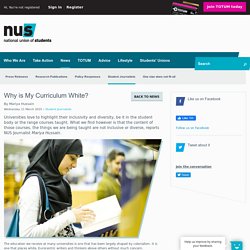
What we find however is that the content of those courses, the things we are being taught are not inclusive or diverse, reports NUS Journalist Mariya Hussain. The education we receive at many universities is one that has been largely shaped by colonialism. It is one that places white, Eurocentric writers and thinkers above others without much concern. This leads to a blindness to other perspectives, and a complete dismissal of the large amounts of thought provoking work produced throughout history by non-white thinkers and scholars. Take a look over your own reading list, how many of the sources on it are non-white? The arts and humanities are the subjects that have the most work to do.
However, even in other departments there are opportunities to learn of non-white scholars in the field, opportunities that are too often not even considered. We are in the midst of a mental health crisis – advice about jogging and self-care is not enough. Is there a problem in this sad old world that can’t be solved by physical jerks?
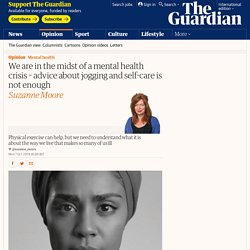
I find myself muttering this, because wherever I go someone is coming up behind me, breathing heavily: a runner. Some of my best friends are joggers – pushing themselves up hills, finishing marathons – it keeps depression and mood swings at bay and it’s free. It’s a good thing, but I cannot be alone in finding underwhelming the advice about looking after one’s mental health as if it is physical health. For example, there is the Every Mind Matters campaign, an initiative from the NHS with a well-intentioned film featuring Prince Harry and Glenn Close. It has a “mind plan”, which gives you “top tips and advice”. I would like to be less aware of acute mental illness. Anyone who has tried to get a bed for someone in acute distress will know they may end up being sent to another part of the country because there are none nearby. People with severe mental illness are not necessarily likable, or comprehensible.
Why Disabled People Need Plastic Straws. I live in the Mission District of San Francisco, where delicious taquerias, bakeries, cafes, and bars are everywhere.
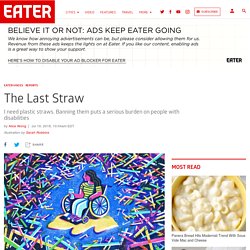
And as a disabled person who uses a wheelchair to get around and a ventilator to breathe, the pleasure of eating and drinking is mediated by a number of factors. When I leave my home for a latte or burrito, a number of calculations go through my head: Will the place have their door propped open so I can enter? If the door is closed, will someone exiting or entering open it for me? Is the counter low enough for the server to see me?
Can they hear and understand me with the mask over my nose if it’s incredibly noisy inside? At one of my favorite neighborhood places, when I make my order, I feel comfortable asking for and receiving assistance. It’s not easy or pleasant asking for help in public spaces like restaurants, because you never know what attitudes you’ll encounter: indifference, pity, or outright rejection. 1. 2. So where do we go from here? 1. 2. 1. 2. Having a Friend With a Disability Is Not Newsworthy. I am a disabled adult and I am bothered by the news stories that highlight when a typical child does something for someone with a disability.
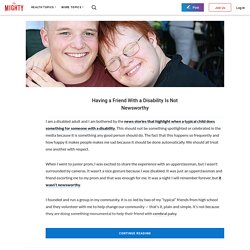
This should not be something spotlighted or celebrated in the media because it is something any good person should do. The fact that this happens so frequently and how happy it makes people makes me sad because it should be done automatically. We should all treat one another with respect. When I went to junior prom, I was excited to share the experience with an upperclassman, but I wasn’t surrounded by cameras. Cosplayer Mandy Pursley Transforms Into Cinderella With a Glass Arm. Like many other people with disabilities, Mandy Pursley never saw herself represented among Disney’s princesses.
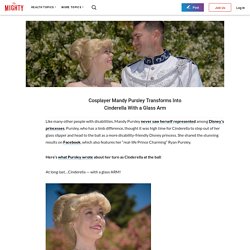
Pursley, who has a limb difference, thought it was high time for Cinderella to step out of her glass slipper and head to the ball as a more disability-friendly Disney princess. She shared the stunning results on Facebook, which also features her “real-life Prince Charming” Ryan Pursley. Our Disabilities Have Made Us Better Scientists. Starting a graduate degree in science was one of the most exciting things to happen to either of us.
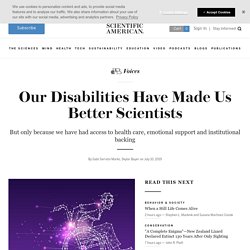
But while we knew that graduate school would be difficult, both of us experienced medical hurdles early in our PhD programs that we never expected. Skylar has a heart condition, polymorphic arrhythmia, and had an implantable cardioverter-defibrillator inserted that ended her scientific scuba-diving career.
Gabi has Ehlers-Danlos Syndrome, a collagen disorder that causes widespread pain, especially during lab and field work. While our medical conditions have challenged us in different ways, we both have noticed that scientific research is rarely designed to accommodate scientists with medical conditions or disabilities. That could be understandable if we were part of a tiny group, but around 26 percent of adults in the United States have a disability.
In fact, we feel that we can be better scientists because of our challenges, not in spite of them. (3) Five Moore Minutes. Hannah Gadsby on Autism and the Risk of Failing After ‘Nanette’ Where’s the Outrage When Colleges Discriminate Against Students With Disabilities? Teen saves two years to buy his friend a wheelchair. Here's why it's not a 'feel-good' story. How disabled employees improve company performance. The labelling issue, by a ‘mildly autistic’ ‘high-functioning’ ‘person with Asperger Syndrome’ - Autistic Not Weird. If you had to describe yourself in one word, what would it be?
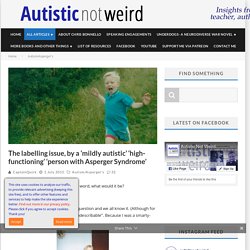
Don’t bother answering. It’s a stupid question and we all know it. (Although for the record, as a child I always used “indescribable”. Because I was a smartypants.) Any kid who looks like this must be some kind of smartypants. But it’s surprising how quickly some people take the word “autistic” and apply it as a valid description of a child (or adult), with no extra words necessary.
Of course, anyone who’s ever even known an autistic person (or ‘person with autism’, but there’ll be plenty of discussion on that later) will know that one word is never enough. I suspect most people know this. At time of writing, this is the most widely-seen post on Autistic Not Weird’s Facebook page. 45,000 people worldwide have seen it according to the stats, which demonstrates how sensitive an issue people find this.
Personally, I try not to place too much importance on specific language. But no, I’m not going back and changing those titles. This woman shared that she's #DisabledAndCute. The internet reacted.